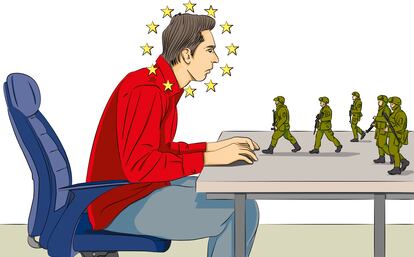The economic landscape after the war
The dilemma facing governments and central banks is complex, and it will require intelligent fiscal support

When I started writing these lines a few weeks ago, the intention was to discuss the economic effects of the war against the pandemic. Because crises destroy paradigms, and the most persistent effect of a crisis – of course, beyond the immediate economic damage and, in the case of the pandemic, the tragic increase in mortality – is the narrative consensus that is formed about its causes and the solutions needed, and the policies adopted.
The emerging market crisis of 1997-98 ended fixed exchange rate regimes, giving way to large-scale accumulation of exchange rate reserves and fiscal and monetary discipline to manage flexible exchange rates. The 2007 financial crisis ended the model of lax banking supervision that relied on market discipline, giving way to a significant tightening of bank capital and liquidity requirements. The euro crisis of 2010 ended the fantasy that a monetary union could be built without common fiscal institutions, laying the foundations that allowed for a rapid common and mutualized reaction to the pandemic. The languid recovery after the financial crisis, suffocated by harsh fiscal discipline that led to a long period of excessively low inflation and zero interest rates, ended the aspiration of expansionary fiscal contractions, giving way to a more active role for fiscal policy.
The rapid recovery after the Covid-19 crisis benefited from all these advances. Fiscal policy led the stimulus, supported by monetary policy. The healthy macroeconomic situation of emerging markets allowed them to weather the storm without requiring external help: no systemic emerging country needed an International Monetary Fund (IMF) program. The abundant capitalization of the banking system allowed it to survive the pandemic unscathed and support growth. The eurozone quickly adopted a common fiscal response, including the issuance of eurobonds, generating a faster and more stable recovery.
The Russian invasion has culminated the process of weaponizing economic interdependence
The innovation of the pandemic was ending the idea that the flexibility of the labor market must always include easier dismissal. The now famous furloughs, adopted in various ways in most developed countries (with the exception of the US), made it possible to keep labor relationships intact and generated a faster recovery in the labor market. To a certain extent, this is what economic theory recommended: in general, it is more efficient to reduce hours worked than to fire workers, since it minimizes the friction and cost generated by both the dismissal and the subsequent hiring. But the idea of subsidizing this process was taboo, as it was feared it would impede the reallocation of resources and spawn legions of zombie companies. In the end, the fears have been unfounded, and the budgetary impact of furloughs, considering the greater economic recovery they have generated, will have been neutral or even positive. Furloughs have come to stay.
I had written up to here when Russia decided to invade Ukraine. And in a few weeks, the world economy has changed in potentially radical ways. Unfortunately, we still do not know how long this war will last, nor what the ceasefire will be like, nor how the reconstruction process will take place in Ukraine. But we can already see the paradigm shifts that will result from the crisis generated by the Russian invasion. After the fog of war clears, the world, and especially Europe, will have changed radically.
Resilience, a concept that was already on the rise, has become the top priority. In the same way that to be physically fit, a healthy diet and weight control are not enough and must be complemented with an investment in a solid abdominal core and robust and flexible muscles, wars – military, diplomatic or economic – are not won just with fiscal discipline but also require military and financial power. The German decision to end decades of military austerity, and the recently announced European energy plan, are accelerating the trend towards the return of the protective state, in search of both technological and energy resilience (or independence). This requires deploying abundant resources and investing in structures that may seem redundant during peace time, but are essential during conflict.
As Russia has realized, fiscal discipline, sound external accounts and abundant exchange rate reserves are not of much use in the face of sanctions that have generated an embargo that will suffocate its economy with something akin to a globalization sudden stop. Faced with this sudden paradigm change, many countries will be considering the usefulness of accumulating abundant international reserves and wonder if, perhaps, it would make more sense to invest them in strengthening their economic infrastructure and in guaranteeing access to technology and natural resources.
The Russian invasion has culminated the process of weaponizing economic interdependence: strengthened by the Trump administration’s trade war, which adopted the use of tariffs as a geostrategic instrument, it has accelerated with the sanctions against Russia. From a model based on global trade relations as a path towards economic efficiency and interdependence as a guarantee of security, we are moving to a model of economic blocks and self-sufficient resilience as a defense mechanism, with uncertain consequences for future global economic growth.
Resilience, a concept that was already on the rise, has become the top priority
Inflation, already high due to the pandemic-related bottlenecks and the impact of the ecological transition on energy markets, has also come to the fore due to the consequences of the Russian invasion. The global shortage of all kinds of raw materials, not only energy but also food, will increase inflation to levels not seen in generations, reaching double digits in some countries. The dilemma that governments and central banks face – rising uncertainty, very high inflation with already tight labor markets and, in Europe, a material worsening of the terms of trade – is very complex and will require smart fiscal support. In the EU, this support will have to be mostly mutualized to allow monetary policy to adjust and manage inflation expectations. The resolution of this dilemma will lay the foundations for the economic policy of the coming cycles.
Until recently, the narrative consensus celebrated the success of the combination of expansionary fiscal policies and patient monetary policies adopted to counter the pandemic. If this inflation scare is not well managed, there is a risk that the narrative consensus will focus on the inflationary failure, and forget the success of the rapid recovery of full employment. And that would be a disaster for future economic growth.
Tu suscripción se está usando en otro dispositivo
¿Quieres añadir otro usuario a tu suscripción?
Si continúas leyendo en este dispositivo, no se podrá leer en el otro.
FlechaTu suscripción se está usando en otro dispositivo y solo puedes acceder a EL PAÍS desde un dispositivo a la vez.
Si quieres compartir tu cuenta, cambia tu suscripción a la modalidad Premium, así podrás añadir otro usuario. Cada uno accederá con su propia cuenta de email, lo que os permitirá personalizar vuestra experiencia en EL PAÍS.
¿Tienes una suscripción de empresa? Accede aquí para contratar más cuentas.
En el caso de no saber quién está usando tu cuenta, te recomendamos cambiar tu contraseña aquí.
Si decides continuar compartiendo tu cuenta, este mensaje se mostrará en tu dispositivo y en el de la otra persona que está usando tu cuenta de forma indefinida, afectando a tu experiencia de lectura. Puedes consultar aquí los términos y condiciones de la suscripción digital.









































